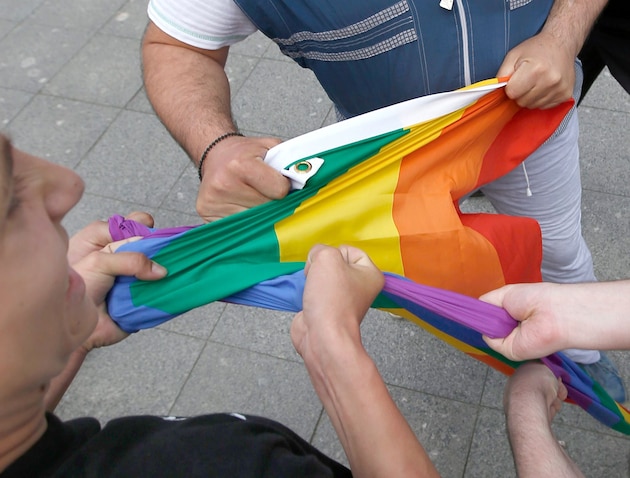The Russian parliament has passed a new law that extends discrimination against non-heterosexual people. With this, Russia is going a step further in the suppression of minorities.
Even before the Russian war of aggression against Ukraine, people with homosexual orientation were discriminated against in Russia – but this has worsened since the beginning of the war. The Russian parliament has now expanded the discrimination of non-heterosexual orientations with a new law.
The law, passed in December, prohibits promoting or “praising” same-sex relationships. In addition, non-heterosexual orientation may not be shown in public. The new decision is an extension of a 2013 law that banned the dissemination of “propaganda” among minors — a violent crackdown on minorities.
What is it like to be a member of the LGBTQ community in Russia? The Washington Post reports on those affected.
The Russian idea of defending traditional Christian beliefs was supposed to justify Putin’s invasion of Ukraine. And now the Russian parliament is invoking this very approach to continue cracking down on LGBTQ people.
The Kremlin wants to maximize the level of criminal prosecution and fines against anyone who expresses themselves in a positive or neutral way towards LGBTQ people. However, to create confusion, the ban is vaguely worded, according to the Washington Post. Human Rights Watch reports that the law “spreads a false and harmful message that attempts to associate LGBTQ people with pedophiles.”
The new law is just one of the measures taken by the Kremlin against LGBTQ Russians. The Washington Post, for example, reports that activist groups and advocates who previously advocated for minorities are now branded “foreign agents” – many have even been expelled from Russia. A majority of LGBTQ foundations and rights groups left Russia after February 24.
With this, Russian President Vladimir Putin is steering in the direction of a closed, conservative society that is closely tied to the Orthodox Church. According to the Washington Post, the opposite of his vision of a “Russian world” is the “amoral” West.
40-year-old Sergei Troshin is also affected by the law: As a member of parliament in St. Petersburg, he is open about his homosexuality despite the ban. He explains to the Washington Post that he only came out last summer. He then received many supportive letters, which prompted him to stay in Russia. He reports that he feels responsible for people.
As Parliament passed the bill, Troshin denounced the discriminatory and homophobic law on Telegram. A few days later, a Russian MP reported the 40-year-old to open an investigation under the “anti-propaganda law.”
Yana and Yaroslava are also under a lot of pressure as they are an openly lesbian couple raising a child in violation of Russian law. The two reported to the Washington Post that just a complaint about their homosexuality would be enough to set the youth welfare office on them.
Yaroslava says the law would have a huge impact on the lives of LGBTQ people: “People either want to hole up in a closet to avoid being noticed, or they’re trying to figure out how to run away.”
30-year-old Yulia is also worried about her safety. The new law has further worsened the living conditions for non-heterosexual people. “Passing this law in December almost felt like the last nail in the coffin.”
She goes on to say that being an LGBTQ person publicly is very difficult, which is why many people censor themselves. Publishers and bookstores should now also hide the covers of books with LGBTQ themes. That’s why Yulia decided to set up the online platform “Psyche for Help” to help other people.
The situation is different in Ukraine. The Washington Post reports that the war revealed a lack of protection and rights for gay soldiers and their partners. That is why Ukrainian President Volodymr Zelenskyy has opened the door to legalizing same-sex civil partnerships in recent months.
The Killer in the Kremlin: Intrigue, Murder, War – Vladimir Putin’s ruthless rise and his vision of a Great Russian Empire















